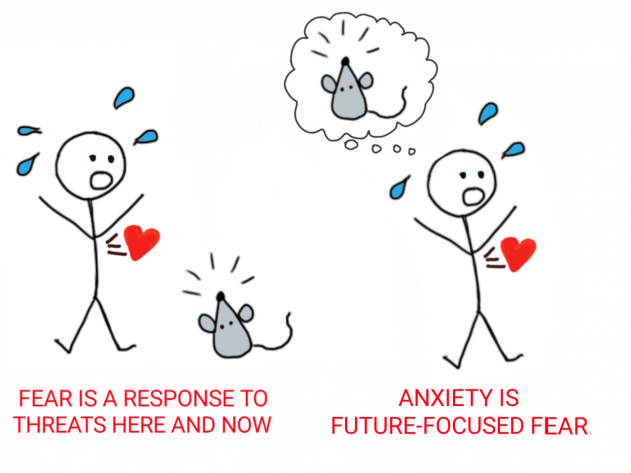Introduction
Ever noticed how time appears to “fly” when there is anxiety—like cramming for an exam—and “freeze” in moments of real fear—like narrowly avoiding a car accident? These aren’t just feelings; they’re reliable shifts in how our brain measures time.
Read More- Trauma and Time
Anxiety vs. Fear
Fear is a sharp, immediate reaction to a clear threat. Heart rate spikes, senses sharpen—and suddenly, every second drips in slow motion (Geoghagen, 2007).

Anxiety, on the other hand, is a cloud of vague worry about what might happen. It’s anticipatory, diffuse—and as researchers have found, it makes our minds shortchange elapsed time.
How Science Proves It
1. Anxiety speeds up time.
Sarigiannidis et al. (2020) induced in participants using a threat-of-shock paradigm. They found that those who felt anxious consistently underestimated time intervals. On average, it caused a substantial rightward shift in the “long” vs. “short” duration perception—d effect size around 0.68 (Sarigiannidis et al., 2020)
2. Fear doesn’t shorten time.
Interestingly, the same study reported that inducing fear—a known threat without anticipatory anxiety—doesn’t compress time the way it does. That sharp, slowed-time feeling comes from acute fear responses, not ongoing worry .
Why It Happens?
Psychologists use the pacemaker–accumulator model to explain time perception (Gibbon et al., 1984). Essentially, our brain’s “clock” emits pulses:
- Anxiety, combining moderate arousal with major attentional wandering, results in less pulse accumulation—so time seems shorter .
- Fear, however, sharply focuses both arousal and attention on the immediate threat—so pulses flood the accumulator, and time stretches (Geoghagen, 2007; Wikipedia, 2025) .
Everyday Vignettes
- Exam crunch: One moment you’re revising; the next—”It’s 3 a.m. already!?”
- Endless Monday: A week of it feels like a day.
- Near-miss moment: You swerve to avoid an accident—time grinds to a crawl, every heart-pounding frame magnified.

Why This Matters
1. Burnout & Stress
When anxiety skews time perception, life feels compressed—hours feel too short, deadlines unmanageable, stress uncontainable.
2. Planning Problems
Consistent underestimation leads to poor scheduling and broken expectations—the classic planning fallacy (Kahneman & Tversky)—made worse by anxiety.
3. Emotional Experience
We lose the ability to savor positive moments. Each day feels like it passed in an anxious blur.

Recalibrate Your Inner Clock
Here’s how to slow the mental hustle:
-
Mindfulness meditation
Anchor attention to the present moment—like your breathing or body sensations—to open the pacemaker gate. -
Automatic suppression
Cue-based calming (e.g., a simple word or gesture) can dampen arousal and restore timing accuracy -
Mental time travel
Reflect on past achievements or envision future success to shift attention away from immediate anxieties. -
Cognitive reframing
Dispute catastrophic thoughts (“I’ll fail forever”) to stop the mental clock from speeding away.
Conclusion
While fear slows your world, anxiety stealthily accelerates it. The good news? Once you understand the “why,” you can press pause. Through attention, awareness, and simple reframing, it’s possible to reclaim those hard-to-hold moments—and feel present again.
References
Geoghagen, T. (2007). Turn back the clock. BBC News Magazine.
Gibbon, J., Church, R. M., & Meck, W. H. (1984). Scalar timing in memory. Annals of the New York Academy of Sciences, 423, 52–77.
Sarigiannidis, I., Grillon, C., Ernst, M., Roiser, J., & Robinson, O. J. (2020). Anxiety makes time pass quicker while fear has no effect. Cognition, 197, 104116. https://doi.org/10.1016/j.cognition.2020.104116
Subscribe to PsychUniverse
Get the latest updates and insights.
Join 3,044 other subscribers!
Niwlikar, B. A. (2025, July 21). Why Anxiety Makes Time Skitter, While Fear Freezes It and 2 Important Ways Science Proves It. PsychUniverse. https://psychuniverse.com/anxiety-and-fear/



